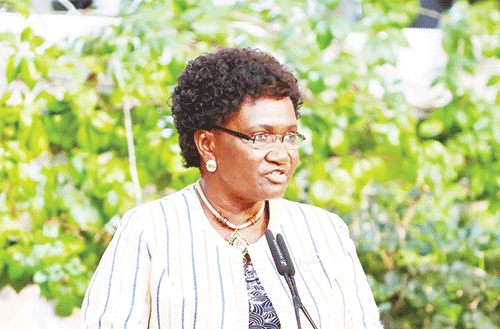Higher education minister Itah Kandjii-Murangi has cautioned that the tertiary education sector is bound to face an exponential increase in the number of students seeking placement, as well as those seeking financial support. In this light, the minister warned that the Namibia Students Financial Assistance Fund (NSFAF) is not enough to cater for students’ needs.
Kandjii-Murangi noted that the NSFAF funded about 15 000 students in 2022 at a cost of N$1.6 billion, while the number further increased in 2023, where it funded about 22 000 students at a cost of N$2.1 billion.
Finance and Public Enterprises Minister Iipumbu Shiimi stated last month while unveiling a N$100.1 billion national budget that the higher education vote has been allocated N$4.8 billion in FY2024/25, 13% higher than the preceding year.
The additional allocation includes N$200 million to NSFAF, bringing their total allocation to N$2.3 billion, and a total of N$7.1 billion over the medium-term expenditure framework (MTEF).
“The ministry is cognisant of the fact that Namibia has gone through a challenging period. This has negatively impacted many Namibians to support their children to enrol at higher education institutions. This also has put pressure on NSFAF,” Kandjii-Murangi stated last week while addressing the high-level tertiary education funding budget review organised by the Namibia Press Agency (Nampa).
NSFAF last year indicated that it needed about N$2.5 billion to cater for the projected number of applications for the upcoming financial year.
In response to the exponential growth of leaners exiting senior secondary schools, the minister said the higher education and training sector has agreed to introduce bridging programmes, and to expand their admissions in some of their programmes.
“Without significant investments
in this sector, their ability to meet over-development targets will not be realised,” she warned.
Meanwhile, at the same occasion, prime minister (PM) Saara Kuugongelwa-Amadhila emphasised that investment into education is one of government’s top priorities for improved access to quality education and sports through improved and expanded education infrastructure, and improved quality of higher education and technical and vocational education and training.
“Education is a very important aspect for any nation’s development because through education, knowledge is imparted to the citizenry, and it prepares them to undertake various professions. We have prioritised education in the budget, and we try to allocate as much resources as we can afford, but we acknowledge that there is still a gap,” she said.
Kuugongelwa-Amadhila further recognised the lack of necessary resources required by the sector, hence government’s drive for public-private partnerships (PPPs) into the sector.
Government also decided that NSFAF should review its funding policy for institutions which can provide quality training in strategic areas to be incentivised.
“Government directed the relevant stakeholders to ensure that within a defined timeframe, we operationalise modalities for implementing PPP so that we can use the investments that we’re making in education as a government to catalyse private sector investment, and also their management skills to actually invest in education, ensuring that we broaden access to quality education,” the PM noted.
Kuugongelwa-Amadhila added that Namibia needs to be educated for it to leverage on the resources the country is endowed with to advance development.
She further implored the youth, once they acquire skills, to invest their knowledge back into the country. -mndjavera@nepc.com.na



